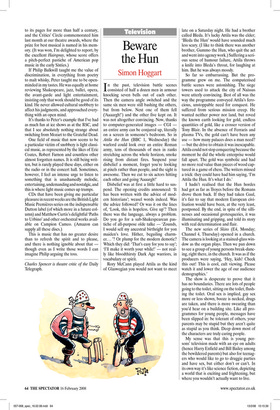Great inspirations
Charles Spencer
‘I think continually of those who were truly great,’ wrote Stephen Spender, which must have been awkward when he was trying to read a map, cook the lunch, or write that bloody awful poem about pylons. But I, too, have been thinking, if not continually, then at least often, about two great men, both dead, both much missed. They couldn’t have been more different, but they both played a major part in forming my attitudes, my taste and perhaps even my character.
Philip Balkwill was my English teacher at Charterhouse, and I was reminded of him early in January when I went to rereview Alan Bennett’s The History Boys at Wyndham’s Theatre. The leading character, Hector, superbly played by Desmond Barrit, is one of those teachers his pupils never forget, offering lessons in life that go far beyond whatever subject he happens to be teaching; and PGB, as he was known at Charterhouse, was in the same mould.
He was undoubtedly an inspirational English teacher, who introduced me to Shakespeare, Hardy, Hopkins, Yeats, Larkin and many more with superb freshness and insight. Unlike Hector, and indeed several other beaks at Charterhouse in my time, there was never any wandering-hand trouble with Philip, who, despite a manner and a voice that I now realise were more than a little camp, was enthusiastically heterosexual.
No, Philip’s vice was booze, and it was one he would indulge with favourite pupils. When you were invited round to his house of an evening, ostensibly to discuss poetry or A-level options, you knew that you would roll back to your house later that night gloriously pissed.
Philip talked brilliantly when the booze was flowing. About everything and anything, from great railway journeys to Beethoven’s late quartets. Indeed when I first began to listen seriously to classical music, Beethoven’s late quartets were where I improbably began, purely because I could remember Philip talking about them with such passion. And what he said remains with me almost 40 years on.
But as with all alcoholics, there was a darker side to Philip’s nature. For the most part genial, funny and humane, he could suddenly turn vicious. Rows with his wife could make schoolboy visitors feel they had inadvertently walked into a production of Who’s Afraid of Virginia Woolf?, and sometimes Philip also turned on the boys who were his guests. I remember him reducing me to tears one night when he tore into what he saw as the fatuity of pop music and my own inanity for liking it. And he carried out his vicious demolition job with the skill and pleasure of a practised sadist.
I learnt a lot from Philip and, among much that was good, I also learnt how to be cruel. I hate to admit it but that, too, proved a useful lesson to someone who was to become a critic.
But the other great man I’ve been remembering was never cruel, though he too was a critic. Peter Hepple was editor of the Stage newspaper for 20 years, and a contributor to its pages for more than half a century, and the Critics’ Circle commemorated him last month at our theatre awards, where the prize for best musical is named in his memory. (It was won, I’m delighted to report, by the excellent Hairspray, whose score offers a pitch-perfect pastiche of American pop music in the early Sixties.) If Philip Balkwill taught me the value of discrimination, in everything from poetry to malt whisky, Peter taught me to be openminded in my tastes. He was equally at home reviewing Shakespeare, jazz, ballet, opera, the avant-garde and light entertainment, insisting only that work should be good of its kind. He never allowed cultural snobbery to affect his judgments, and approached everything with an open mind.
It’s thanks to Peter’s example that I’ve had as much fun at ice shows as at the RSC, and that I see absolutely nothing strange about switching from Mozart to the Grateful Dead.
One field of music that now seems to be a particular victim of snobbery is light classical music, as represented by the likes of Eric Coates, Robert Farnon and countless other almost forgotten names. It is still being written, but is rarely played these days, either on the radio or in the concert hall. Sometimes, however, I feel an intense urge to listen to something that is unashamedly melodic, entertaining, undemanding and nostalgic, and this is where light music comes up trumps.
CDs that have been giving me particular pleasure in recent weeks are the British Light Music Premières series on the indispensable Dutton label (of which more in a future column) and Matthew Curtis’s delightful ‘Paths to Urbino’ and other orchestral works available on Campion Cameo. (Amazon can supply all these discs.) This is music that has no greater desire than to refresh the spirit and to please, and there is nothing ignoble about that — though even as I write those words I can imagine Philip arguing the toss.
Charles Spencer is theatre critic of the Daily Telegraph.



















































































 Previous page
Previous page